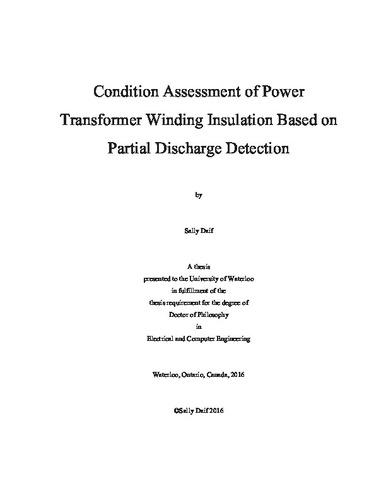| dc.description.abstract | Power transformers are important components of power systems, as their failure can result in major losses to electric utilities. Transformer windings are responsible for approximately 30% of transformer failures. A principal cause of these failures is winding insulation failure due to partial discharge (PD). When PD occurs in power transformers, the insulation system is damaged in two ways: by gases created from the oil and paper, and by degradation of its solid insulation. Solid insulation degradation is correlated with the PD apparent charge value, which is usually measured by conventional PD detectors. However, conventional PD detectors are not suitable for use in a transformer environment due to noise interference and the transformer’s complex internal design. In addition to PD apparent charge, identifying the nature of the PD is essential for assessing the transformer winding insulation condition. Due to the difficulties associated with PD measurement in a transformer environment, PD severity assessment is still performed by dissolved gas analysis, which does not provide enough details about the PD’s crucial characteristics and hence the transformer insulation condition. To address these shortcomings, this research develops two distinct modules: PD detection and PD severity assessment. Using the leakage current measured at the transformer neutral, the detection module determines the PD charge, PD location, and PD source type in the transformer winding insulation. The severity assessment module then uses this information to assess the transformer winding insulation condition.
In the PD detection module, the leakage current measured at the transformer neutral undergoes three modules: PD source classification, PD localization, and PD charge determination. The techniques used for PD source classification and localization are based on designing feedforward neural network classifiers using the statistical features extracted from leakage current signals, corresponding to different origins, sources or locations. The developed modules are tested on a three-phase transformer. The selection of the proper feature combination to in designing the neural networks results in better recognition of PD source type and location. In the PD charge determination module, the PD charge is calculated from the PD current injected into the transformer winding during a PD event, using both the corresponding leakage current and the winding transfer function. For the transformer under test, a bank of transfer functions from all possible locations along the winding to the transformer neutral is developed and used in the charge calculation module. The error between the measured and calculated charges is 10% or less.
In the PD severity assessment module, a fuzzy logic system maps the PD characteristics, charge and source, into a quantitative index called the partial discharge index (PDI). Based on the damage caused to the insulation system by the PD charge and source, the PDI is used to classify the transformer condition into one of five categories: normal, questionable, harmed, critical, and dangerous. This PDI can also be used in transformer health index calculations. | en |

